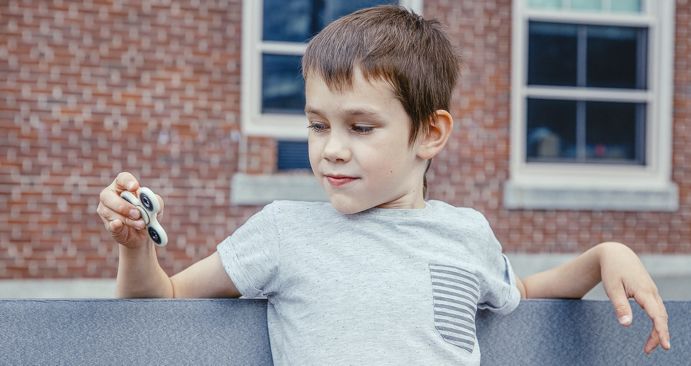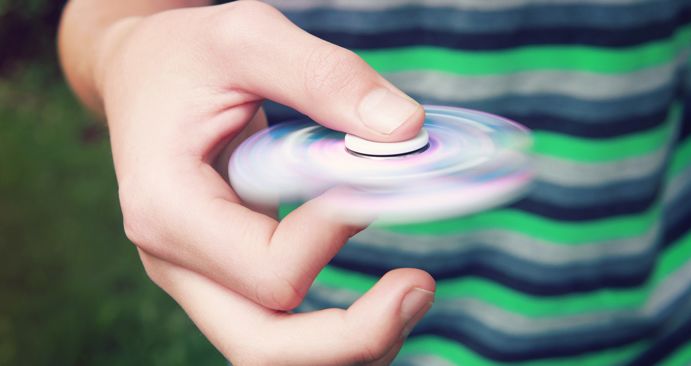Can Fidget Spinners Help Your Child with Autism and ADHD?
Updated on March 11, 2024If your child’s school hasn’t been hit by the fidget spinner, don’t hold your breath. These hypnotic toys are popping up everywhere, and for good reason. They’re captivating and children love them. What’s not to love about a toy that not only becomes more entertaining with every spin, but also relieves stress, anxiety and improves concentration?

At least that’s how these unassuming spinners are marketed. Seems harmless enough until you stumble on spinners which in addition to relieving stress and anxiety claim to help with ADHD and autism. A bold claim for a pocket-sized toy. But is there any truth to it?
Fidget spinners are a very new trend which has taken schools worldwide by storm. And while many special needs children and parents have embraced these toys, the reception hasn’t been all positive. Many schools have been quick to flag spinners as a nuisance and unwanted classroom distraction. In fact, fidget spinners are now banned in 32% of the top 200 American high schools. But not everyone agrees with this line of thinking.
What we know about fidget spinners – not much!
In case you haven’t seen one go whirling by, fidget spinners are three-pronged gadgets with a bearing in the center that you hold. By gently flicking one of the prongs, the gadget will begin to spin for about a minute in a similar fashion to a ceiling fan. This whirling motion is hypnotizing to watch.
The gadgets have quickly become one of the trendiest toys of 2017 as can be seen by the popularity of this search term on Google search. It’s also interesting to look at the number of online vendors selling fidget spinners. It’s estimated that there are over 8,000 sellers on Amazon. While on e-commerce platforms like eBay and Alibaba, you can find over 3,000 vendors selling 600,000 different types of fidget spinners. Fidget spinners were first publicized at the North American International Toy Fair in February 2017. Since then it’s estimated that over 200 million of these gadgets have shipped to retailers.

But beyond their popularity, the reality is that we don’t really know that much about spinners and how they impact people with ADHD and autism. They’re simply too new, and there isn’t enough data or academic research to make any conclusions. And that’s just what this thriving industry needs: room for doubt. The director of the Attention, Impulsivity and Regulation program at the UC Davis MIND Institute, Julie Schweitzer, made the point that: “I can’t say that they [fidget spinners] for sure don’t work, but there’s no evidence to support that they do…”
Don’t be so quick to dismiss spinners
While there may not be any research into the efficacy of spinners as an aide for people with ADHD and autism, there’s plenty of anecdotal evidence. One mom with ADHD described how she and her son, who has a sensory processing disorder, use a spinner to improve focus. She explains how for her and her son, spinners have the same effect as bouncing a ball, but this is silent and can be done anywhere at anytime. She explained that: “After a period of using the device, both of us feel as though our tactile responsiveness — how we respond to input from outside forces — feels less maladapted to change than it typically does.”
Motherboard recently published an article which aimed to explore how fidget spinner manufacturers can market these devices as a form of treatment for ADHD and autism. After it was published, the article was edited to include an Editor’s Note which explained that since publication many people contacted the publication explaining how spinners helped them and their children with autism, ADHD and anxiety cope.

Whether or not these claims are just wishful thinking or grounded in truth, it seems there may be something to these gadgets after all. At least one expert thinks that spinners may indeed have a role to play in helping children with autism and ADHD concentrate in the classroom. After all, objects which allow children with autism and ADHD fidget are known to have a calming effect. Claire Heffron, a pediatric occupational therapist in Cleveland, explained: “These little gadgets should be called fidget tools, not toys, and they can be part of a successful strategy for managing fidgety behavior if they are introduced as a normal part of the classroom culture.”
Why some remain skeptical
But not everyone is convinced about the benefits of the fidget spinner. Some experts, like Dr Mark Rapport, MD and Director of the Children’s Learning Clinic at the University of Central Florida’s Department of Psychology, make the point that spinners are nothing more than a distraction. Rapport explained that since spinners are fascinating to look at, they would take a child’s attention away from whatever they’re meant to be focusing on. This serves as a nothing more than a fun distraction, and means that a child cannot focus on the task at hand.
Those in favor of fidget spinners like to quote a 2015 study from the Journal of Abnormal Child Psychology which proved that gross motor activity helps children with ADHD perform better on working memory tasks. While this is an interesting study, it’s not relevant here. After all a child playing with a fidget spinner isn’t performing any gross motor activity. Unlike playing with a fidget spinner, bouncing on a yoga ball, for example, is the kind of non-distracting activity which could be beneficial to a child with ADHD.
Spinning out of control
The reality is that without a comprehensive study, it’s really anyone’s guess. Fidget spinners could be nothing more than a passing trend, or they may be the therapeutic tool children with autism and ADHD have been looking for. Only time will tell.
Does your child have a fidget spinner? What is your experience of this trendy gadget so far, and would you recommend it for other children with autism and ADHD? Share your thoughts in the comments below.
AngelSense is committed to creating a safer world for children with special needs. We designed the AngelSense GPS Child tracker solution to give parents the peace of mind that their child is safe at all times.
Get peace of mind from AngelSense, the groundbreaking AI-based assistive technology designed to enhance safety and peace of mind for individuals with special needs and their families. Our solution ensures you stay connected with your loved ones, empowering a higher level of independence while maintaining safety. Learn more about how AngelSense can make a difference for your family.

